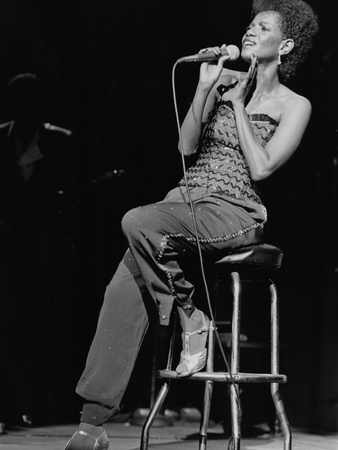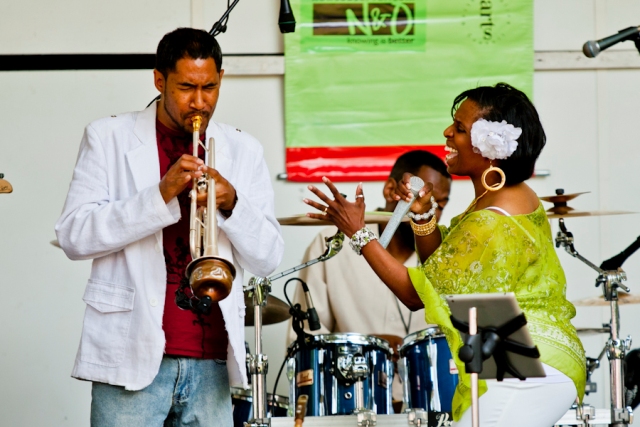Legendary R&B vocalist Melba Moore stars as the bombastic director of a Southern church choir in Lolita Snipes‘ gospel musical GOOD GOD A’MIGHTY, playing Feb. 14-24 at 14th Street Playhouse. A hilarious behind-the-scenes look inside a southern African-American church faced with a vibrant new pastor from New York, the play marks a bit of irony in that Melba is a born-and-bred New Yorker herself.
Because Melba is best known for a string of ’70s and ’80s Billboard hits starting with “I Got Love,” it’s easy to forget that her first big break came on Broadway when she replaced Diane Keaton in HAIR. She went on to win a Tony Award for playing Lultiebelle in PURLIE and appeared with Eartha Kitt in TIMBUKTU. Then her recording career took off, she started touring, and would not return to the theater until after a painful break-up with her husband. She used her remarkable life story as the backdrop for a one-woman play, I’M STILL STANDING, and soon was back on Broadway as Fantine in LES MISERABLES. Since then she has continued her comeback, including appearing with Beyonce and Cuba Gooding Jr. in the movie THE FIGHTING TEMPTATIONS (2003) and recording a new CD entitled FOREVER MOORE on her own label, A’Moore Music.
ATLRetro recently had the pleasure of interviewing Melba, and we couldn’t resist not just asking about her role but also her own Retro experiences growing up in a musical family in New York in one of the most exciting jazz music eras, the summer of love, working with Eartha Kitt, and much more. The conversation turned into a who’s who history lesson of some of the top names in recording which we couldn’t be happier to share.
How did you first get involved with GOOD GOD A’MIGHTY?
Lolita Snipes, the producer and writer of GOOD GOD A’MIGHTY, and her partner and husband, Jerome [Snipes], got in touch with my manager and myself. We met in New York, and she said she had been watching me for quite a long time and knew I would be prefect for the role. I was a little surprised because though I do have a Tony Award for a comedy performance, I haven’t done a lot of comedy. She said the main reason she wanted me for the role was the music. She wanted the Melba Moore sound. She also wanted to make sure born-again Christians were involved in the play, and she wanted me because I had a reputation of being amenable, in harmony with the person in charge. She wanted to make sure that it was a real Christian play with the real Christian spirit, which is love.
 You aren’t from the south but you certainly have a lot of experience with New York City having grown up there. Is there anything particular which resonates to you about this story personally?
You aren’t from the south but you certainly have a lot of experience with New York City having grown up there. Is there anything particular which resonates to you about this story personally?
It’s great in terms of a family culture because pretty much all of us originated from the south because we came here as slaves. We were farmers and eventually moved to the north, and we still have cultural clashes between north and south. Northerners are often considered educated and uppity by Southerners. These cultural clashes are nice food for comedy.
My mother was a professional singer and away all the time so I was raised in New York by a nanny who never learned to read or write, but came from a family of tobacco growers and sharecroppers. She was trying to get off the farm and get a job that was not so hard even if it was as a domestic or nanny. The thing that set many African-American families free was our music and the music industry, so my family was typical of that combination.
Tell us about your part and did you do anything in particular to prepare for it.
THE FIGHTING TEMPTATIONS. Look at the role that LaTanya Richardson – she’s the wife of Samuel L Jackson – played in that. She was feisty, bossy; she runs everybody. She doesn’t care who you are, she’s the boss. She will bring you down to size all the time. She’s a very selfish, mean-spirited ogre. That’s my part.
But it’s not dark or brutal. This is a Christian musical, so we don’t want to tell the bad news. She is not mean or evil. That’s one of the things that sets apart gospel plays or musicals. You’re not telling a negative story nor sympathizing with the bad guy.
This musical just sounds like a lot of fun. Is there a favorite part that you’d like to share?
It’s going to be so much fun. First of all, gospel comedies are the funniest type of comedy, and maybe one of the reasons they are is they don’t pander to the lowest elements of people. They don’t resort to cursing or really poking fun at people. They don’t have to be deep, but really have to be funny. They have to be joyful, really lift your spirits. That’s the point of it.
 You grew up in a musical family. Your mother was a singer, your father a saxophonist and your stepfather a jazz pianist. Can you talk a little bit about growing up with jazz in the golden age of the 1940s and 1950s, maybe share a favorite memory?
You grew up in a musical family. Your mother was a singer, your father a saxophonist and your stepfather a jazz pianist. Can you talk a little bit about growing up with jazz in the golden age of the 1940s and 1950s, maybe share a favorite memory?
My stepfather [Clement Moorman] is 97 years old. He still plays the piano and keeps his art. He plays better than ever before. My mother, though, has passed away. I grew up in an environment with a passionate love for music, and in an age when African-American artists had to be 10 times better because of racism. I grew up meeting Sarah Vaughan and Ella Fitzgerald. I thought I was going to be a piano player. I thought I’d be the next Horace Silver. I knew I was not going to be the next Oscar Peterson. My brother and I learned how to play these piano solos because we were so passionately enmeshed in this music. We were equally impassioned by classical music so also Leontyne Price or Marian Anderson. As I look back, it’s not just nostalgia, it just was truly a golden age. I majored in music in high school. I didn’t know if I had enough talent but I knew it was going to be my life’s work. I didn’t know if I would be a musician or singer, but I grew up listening also to Miles Davis and Nancy Wilson. I was totally enmeshed and absorbed in their recording.
Who was your favorite jazz performer in those early days and why? Outside of your family, of course.
They kept changing. Bill Evans and Horace Silver were two of our favorites. We’d sing all the solos. The Adderley Brothers, Nat Adderley, and the sax player Art Farmer. I can’t remember them all. There was just a plethora. I also loved Melba Liston because she had my name. And Ella Fitzgerald. I can sing her solos now, but I couldn’t then.
What was it like spending the summer of love in New York City and ending up cast in HAIR?
It was very unexpected. I was teaching music from kindergarten thru age 12 of high school in northern New Jersey, and I quit because I felt like if I stayed in teaching, I never was going to find out if I had enough talent to be a singing artist. My father took me to New York, where I met Valerie Simpson, who got me involved in overdub singing, At one of the recording sessions, Galt MacDermott, who wrote the music for HAIR, asked us all if we could come and sing for the director, choreographer and producer because they were still looking for strong voices. I was the only one who said yes. It was like I can’t even describe it – moving to another planet.
 What was it like working with Eartha Kitt in TIMBUKTU?
What was it like working with Eartha Kitt in TIMBUKTU?
She definitely was an icon and an artiste and her own self-person. She was intimidating in a sense. She was so strong and so confident and so good, and my personality was totally opposite. I was just starting to get some confidence now, but I have a gentle body language. We’re both petite women but total opposites. She was a cat and I was a kitty.
You started acting in musical theater in your twenties in HAIR and then winning the Tony for PURLIE, but then concentrated on your music career. How did you end up coming back to Broadway in 1995 to play Fantine in LES MISERABLES?
After TIMBUKTU, I went on tour and had my first hit record. I did 10 to 15 years of recording and touring. Then my marriage to my husband, who had been responsible for my success, disintegrated. During that time, I was trying to stay alive, much less stay in the industry. I did a one-woman play [SWEET SONGS OF THE SOUL, later renamed I’M STILL STANDING], and I began to climb back up the mountain. Richard Jay-Alexander, the casting director for LES MISERABLES on Broadway, saw me in Florida in my own play. He said he came in to see the play., but what he saw different sides of Melba Moore that he had never known. He had only seen me in PURLIE. He didn’t know I had a classical voice, or the other aspects of personality. It was thanks to I’M STILL STANDING that Lolita and Jerome found me, too. It was a wonderful audition piece for me.
You were the first African-American to play Fantine, the role that Anne Hathaway is favored for an Oscar this year. Can you talk a little about that experience?
I was just trying to survive, and then someone takes me and puts me into that role. When I got into it and realized what it was about, I thought, God put me here. How do you go from nothing to a lead role in LES MIZ? It showed me this is my destiny, where my good luck will happen. It was so much more than just playing a role and was a natural one to me.
It seems like certain songs play special roles at different times in one’s life. You have a long repertoire. Is there one song from it that means more now than it ever before, and if yes, why?
There are two songs. One is “I Got Love” from PURLIE, and the other is “Lean on Me,” written by Van McCoy. The longer I sing it, the more that I see that the song is my life. It’s always relevant, and the longer I sing it, because it is about your life going the right way, the more powerful it is again. It doesn’t depend on any age, any gender gap. It’s about people coming together, and the place that unites us is that magic of music which unites us. Some things pass away. With GOOD GOD A’MIGHTY, this play, I am beginning again at a fresh point. All those things that are retro and nostalgic have a fresh life again. That’s what music can be. In pop culture, we try to make things old and passing away, but that’s not what art is. Art lives.
Purchase tickets for GOOD GOD A’MIGHTY here or at the Woodruff Arts Center Box Office.




